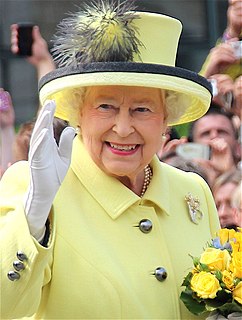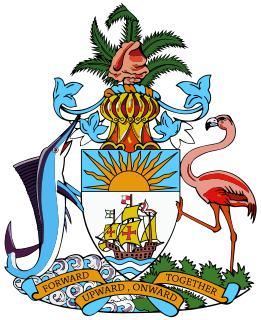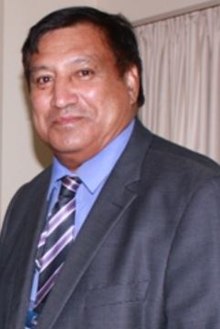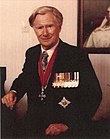
Governor-general, or governor general, is the title of an office-holder. In the context of governors-general and former British colonies, governors-general are appointed as viceroy to represent the monarch of a personal union in any sovereign state over which they don't normally reign over in person. Governors-general have also previously been appointed in respect of major colonial states or other territories held by either a monarchy or republic, such as Japan in Korea and France in Indochina.

A Commonwealth realm is a sovereign state in the Commonwealth of Nations whose monarch and head of state is the monarch of the United Kingdom. Each realm functions as an independent state, equal with the other realms and nations of the Commonwealth. The monarch of the Commonwealth realms is King Charles III who succeeded his mother, Elizabeth II on 8 September 2022.

The monarchy of New Zealand is the constitutional system of government in which a hereditary monarch is the sovereign and head of state of New Zealand. The current monarch, King Charles III, ascended the throne on the death of his mother, Queen Elizabeth II, on 9 September 2022 (NZST). Charles' eldest son, William, Prince of Wales, is heir apparent.

The governor-general of Solomon Islands is the vice-regal representative of the Solomon Islands' monarch, currently King Charles III, in Solomon Islands. The governor-general is appointed by the monarch after their nomination by the National Parliament by vote, although the monarch is not bound to accept that nomination for appointment. The functions of the governor-general include appointing ministers, judges, and ambassadors; giving royal assent to legislation passed by parliament; and issuing writs for election.

The monarchy of Solomon Islands is a system of government in which a constitutional monarch is the head of state of Solomon Islands. The present monarch is King Charles III, who is also the head of state of fourteen other Commonwealth realms. Although the person of the sovereign is equally shared with 14 other independent countries within the Commonwealth of Nations, each country's monarchy is separate and legally distinct. As a result, the current monarch is officially titled the King of Solomon Islands and, in this capacity, he and other members of the royal family undertake public and private functions domestically and abroad as representatives of Solomon Islands. However, the King is the only member of the royal family with any constitutional role.

The monarchy of Antigua and Barbuda is a system of government in which a hereditary monarch is the sovereign and head of state of Antigua and Barbuda. The current Antiguan and Barbudan monarch and head of state, since the independence of Antigua and Barbuda on 1 November 1981, is the King of the United Kingdom, which currently is Charles III. As sovereign, he is the personal embodiment of the Crown of Antigua and Barbuda. Although the person of the sovereign is equally shared with 14 other independent countries within the Commonwealth of Nations, each country's monarchy is separate and legally distinct. As a result, the current monarch is officially titled King of Antigua and Barbuda and, in this capacity, he and other members of the Royal Family undertake public and private functions domestically and abroad as representatives of Antigua and Barbuda. However, the King is the only member of the Royal Family with any constitutional role.

The governor-general of New Zealand is the viceregal representative of the monarch of New Zealand, currently King Charles III. As the King is concurrently the monarch of 14 other Commonwealth realms and lives in the United Kingdom, he, on the advice of his New Zealand prime minister, appoints a governor-general to carry out his constitutional and ceremonial duties within the Realm of New Zealand.

The monarchy of Australia is Australia's form of government embodied by the Australian sovereign and head of state. The Australian monarchy is a constitutional monarchy, modelled on the Westminster system of parliamentary government, while incorporating features unique to the Constitution of Australia.

The Cook Islands are a constitutional monarchy within the Realm of New Zealand. Under the Cook Islands Constitution, the Sovereign in Right of New Zealand has been Head of State of the Cook Islands since 4 August 1965. The Sovereign is represented by the King's Representative; as such, the King is the de jure head of state, holding several powers that are his alone, while the King's Representative is sometimes referred to as the de facto head of state. The viceregal position is currently held by Tom Marsters.

The monarchy of Jamaica is a constitutional system of government in which a hereditary monarch is the sovereign and head of state of Jamaica. The terms Crown in Right of Jamaica, His Majesty in Right of Jamaica, or The King in Right of Jamaica may also be used to refer to the entire executive of the government of Jamaica. Though the Jamaican Crown has its roots in the British Crown, it has evolved to become a distinctly Jamaican institution, represented by its own unique symbols.

The monarchy of Belize is a system of government in which a hereditary monarch is the sovereign and head of state of Belize. The current Belizean monarch and head of state is King Charles III. As sovereign, he is the personal embodiment of the Belizean Crown. Although the person of the sovereign is shared with 14 other independent countries within the Commonwealth of Nations, each country's monarchy is separate and legally distinct. As a result, the current monarch is officially titled Kingof Belize and, in this capacity, he and other members of the royal family undertake public and private functions as representatives of the Belizean state. However, the King is the only member of the royal family with any constitutional role.

The monarchy of Barbados was a system of government in which a hereditary monarch was the sovereign and head of state of Barbados from 1966 to 2021. Barbados shared the Sovereign with the other Commonwealth realms, with the country's monarchy being separate and legally distinct. The Barbadian monarch's operational and ceremonial duties were mostly delegated to her representative, the Governor-General of Barbados.

The monarchy of the Bahamas is a system of government in which a hereditary monarch is the sovereign and head of state of Commonwealth of the Bahamas. The current Bahamian monarch and head of state, is King Charles III. As sovereign, he is the personal embodiment of the Bahamian Crown. Although the person of the sovereign is equally shared with 14 other independent countries within the Commonwealth of Nations, each country's monarchy is separate and legally distinct. As a result, the current monarch is officially titled King of the Bahamas and, in this capacity, he and other members of the royal family undertake public and private functions domestically and abroad as representatives of the Bahamian state. However, the King is the only member of the Royal Family with any constitutional role.

The monarchy of Papua New Guinea is a system of government in which a hereditary monarch is the sovereign and head of state of Papua New Guinea. The current monarch, since 9 September 2022, is King Charles III. Although the person of the sovereign is equally shared with 14 other independent countries within the Commonwealth of Nations, each country's monarchy is separate and legally distinct. As a result, the current monarch is officially titled the King of Papua New Guinea and, in this capacity, he and other members of the Royal Family undertake public and private functions domestically and abroad as representatives of the Papua New Guinean state. However, the King is the only member of the Royal Family with any constitutional role. The King lives predominantly in the United Kingdom and, while several powers are the sovereign's alone, most of the royal governmental and ceremonial duties in Papua New Guinea are carried out by the King's representative, the governor-general.

The monarchy of Saint Kitts and Nevis is a system of government in which a hereditary monarch is the sovereign and head of state of Saint Kitts and Nevis. The current monarch of Saint Kitts and Nevis, since 8 September 2022, is Charles III. As sovereign, he is the personal embodiment of the Crown of Saint Kitts and Nevis. Although the person of the sovereign is equally shared with 14 other independent countries within the Commonwealth of Nations, each country's monarchy is separate and legally distinct. As a result, the current monarch is officially titled King of Saint Christopher and Nevis and, in this capacity, he and other members of the royal family undertake public and private functions domestically and abroad as representatives of Saint Kitts and Nevis. However, the King is the only member of the royal family with any constitutional role.

The monarchy of Saint Lucia is a system of government in which a hereditary monarch is the sovereign and head of state of Saint Lucia. The current monarch is King Charles III. The previous Saint Lucian monarch and head of state from the independence of Saint Lucia on 22 February 1979 until her death on 8 September 2022, was Queen Elizabeth II. As sovereign, the King is the personal embodiment of the Saint Lucian Crown. Although the person of the sovereign is equally shared with 14 other independent countries within the Commonwealth of Nations, each country's monarchy is separate and legally distinct. As a result, the current monarch is officially titled King of Saint Lucia and, in this capacity, he and other members of the Royal Family undertake public and private functions domestically and abroad as representatives of the Saint Lucian state. However, the King is the only member of the royal family with any constitutional role.

The monarchy of Tuvalu is a system of government in which a hereditary monarch is the sovereign and head of state of Tuvalu. The present monarch of Tuvalu is King Charles III, acceding on 9 September 2022, who is also the Sovereign of 14 other Commonwealth realms. The King's constitutional roles are mostly delegated to the Governor-General of Tuvalu.
The Australian head of state dispute is the ongoing debate as to who is considered to be the head of state of Australia—the monarch, the governor-general, or both. Head of state is a description used in official sources for the monarch. The Australian constitution does not mention the term head of state. In discussion it has been used for describing the person who holds the highest rank among the officers of government. A number of writers, most notably Sir David Smith (1933–2022), have argued that the term is better used to describe the governor-general. The difference of opinion has mainly been discussed in the context of Australia becoming a republic, and was prominently debated in the lead-up to the republic referendum in 1999.
The Constitution of Tuvalu states that it is “the supreme law of Tuvalu” and that “all other laws shall be interpreted and applied subject to this Constitution”; it sets out the Principles of the Bill of Rights and the Protection of the Fundamental Rights and Freedoms.






















